 The digital rights campaigning group, Open Rights Group, reports that the music industry is lobbying MEPs to co-opt the EU Data Retention legislation currently being debated by the European Parliament.
The digital rights campaigning group, Open Rights Group, reports that the music industry is lobbying MEPs to co-opt the EU Data Retention legislation currently being debated by the European Parliament.
Music industry body, the Creative and Media Business Alliance (CMBA), wants data-snooping legislation aimed at the prevention of terrorism to be made available for the prosecution of any crime, such as copyright infringement.
The move has been condemned by the Open Rights Group and other civil liberties groups across Europe, with campaigners calling on the Alliance’s members – which include industry bigwigs like Sony BMG, Warner Music, Disney, and EMI – to retract their demands.
The Data Retention draft framework was originally cooked up by Sweden, Ireland, France and the UK, aiming at “the prevention, investigation, detection and prosecution of serious criminal offences such as terrorism and organised crime” by forcing telecommunications and Internet service providers to retain ‘traffic data’ (i.e. information about your phone calls and Internet activities.)
Keen to exploit the legislation for their own commercial gain, the CMBA has demanded that this data should be made available for the prosecution of any crime – e.g. illegal music file sharing – and not just serious organised crime and terrorism.
 Coupled with the upcoming IPRED2 legislation (which creates new, Europe-wide criminal offences for intellectual property infringement), campaigners fear that we could end up with a situation where the music industry would be able to pursue criminal court copyright prosecutions entirely at the cost of the taxpayer.
Coupled with the upcoming IPRED2 legislation (which creates new, Europe-wide criminal offences for intellectual property infringement), campaigners fear that we could end up with a situation where the music industry would be able to pursue criminal court copyright prosecutions entirely at the cost of the taxpayer.
Worryingly, the Open Rights Group reports that the both the Data Retention and IPRED2 directives are being “fast-tracked” through the EU by short-circuiting normal legislative processes.
This means that there will only be one reading in the European Parliament, instead of the normal two, with sources from within the Parliamentary system indicating that some MEPs aren’t aware that the usual democratic process is being bypassed.
A tight timetable means that MEPs are only going to have a couple of days to assess the Data Retention proposal with the final vote occurring on the 13 December.
“The passing of the Data Retention directive would be a disaster not just for civil liberties and human rights in Europe”, said Open Rights Group director Suw Charman, “it would also put a substantial financial burden on telcos and ISPs which would be passed on to the consumer either in the form of raised bills or through government subsidies funded by the taxpayer.”
 Ian Brown, of the Open Rights Group (not the Stone Roses), said: “The British government claimed that Data Retention was essential in the fight against terrorism and serious crime, but it has now become clear that groups with commercial interests have their eye on the same data. Charles Clarke cannot continue to pretend that this legislation has been drafted purely for reasons of national security.”
Ian Brown, of the Open Rights Group (not the Stone Roses), said: “The British government claimed that Data Retention was essential in the fight against terrorism and serious crime, but it has now become clear that groups with commercial interests have their eye on the same data. Charles Clarke cannot continue to pretend that this legislation has been drafted purely for reasons of national security.”
Gus Hosein, Senior Fellow at Privacy International, was equally unimpressed: “The EU has been claiming that data retention was some urgent policy response to terrorist attacks. But they are carefully drafting this legislation to ensure that it can be used for all purposes under the sun.”
“Ironically, the EU seems to be going at it alone: even the U.S. Bush Administration is not proposing such a ludicrous policy, despite the strong lobbying by Hollywood.” he added.
There are fears that if the CMBA is successful, the increased number of demands for access could affect the usefulness of the legislation as an anti- terrorism tool.
The Open Rights Group argue that if British record labels set up prosecution ‘production lines’ like their American counterparts, the system could collapse under the strain, clogging up reasonable and legitimate enquiries into genuine terrorist or serious crime activity.
Today, Sjoera Nas, Board Member of EDRi and Co-Director of Bits of Freedom presented a 58,000 signatures petition to the Chairman of the Committee, Green Party MEPs, Christian Democrats and the Social Democrats.
Nas commented, “Last minute negotiations with representatives of the European Council have lead to what we feared the worst – a draconian directive that flies in the face of our recommendations.”
“We can only hope that the European Parliament will come to its senses and realise that they cannot turn Europe into a surveillance society overnight without throwing away all human rights,” she added.
Open Rights Group
 As we predicted last week, the US TV networks are not taking the new TiVo enhancements to its TivoToGo lying down.
As we predicted last week, the US TV networks are not taking the new TiVo enhancements to its TivoToGo lying down. It could be, that time will prove TiVo have announced prematurely this new augmentation, without fully taking account of the wide ranging business and legal implications. But in this fast moving sector, innovation is a necessity rather than an option.
It could be, that time will prove TiVo have announced prematurely this new augmentation, without fully taking account of the wide ranging business and legal implications. But in this fast moving sector, innovation is a necessity rather than an option. The digital rights campaigning group, Open Rights Group, reports that the music industry is lobbying MEPs to co-opt the EU Data Retention legislation currently being debated by the European Parliament.
The digital rights campaigning group, Open Rights Group, reports that the music industry is lobbying MEPs to co-opt the EU Data Retention legislation currently being debated by the European Parliament. Coupled with the upcoming IPRED2 legislation (which creates new, Europe-wide criminal offences for intellectual property infringement), campaigners fear that we could end up with a situation where the music industry would be able to pursue criminal court copyright prosecutions entirely at the cost of the taxpayer.
Coupled with the upcoming IPRED2 legislation (which creates new, Europe-wide criminal offences for intellectual property infringement), campaigners fear that we could end up with a situation where the music industry would be able to pursue criminal court copyright prosecutions entirely at the cost of the taxpayer.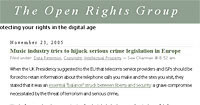 Ian Brown, of the Open Rights Group (not the Stone Roses), said: “The British government claimed that Data Retention was essential in the fight against terrorism and serious crime, but it has now become clear that groups with commercial interests have their eye on the same data. Charles Clarke cannot continue to pretend that this legislation has been drafted purely for reasons of national security.”
Ian Brown, of the Open Rights Group (not the Stone Roses), said: “The British government claimed that Data Retention was essential in the fight against terrorism and serious crime, but it has now become clear that groups with commercial interests have their eye on the same data. Charles Clarke cannot continue to pretend that this legislation has been drafted purely for reasons of national security.” P2P network, BitTorrent has signed an agreement with the Motion Picture Association of America to collaborate on stopping Internet piracy.
P2P network, BitTorrent has signed an agreement with the Motion Picture Association of America to collaborate on stopping Internet piracy. “BitTorrent Inc. discourages the use of its technology for distributing films without a license to do so. As such, we are pleased to work with the film industry to remove unauthorised content from BitTorrent.com’s search engine,” he added.
“BitTorrent Inc. discourages the use of its technology for distributing films without a license to do so. As such, we are pleased to work with the film industry to remove unauthorised content from BitTorrent.com’s search engine,” he added.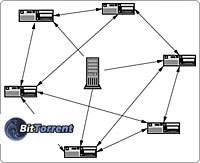 The MPAA claims that the film industry lost $3.5 billion to movie piracy last year, with a recent study predicting the figure to jump to $5.4 billion this year. The MPAA claim these losses are excluding revenue lost through online file-swapping, so the true figure could be even higher (although other will say the figures are already gloriously exaggerated).
The MPAA claims that the film industry lost $3.5 billion to movie piracy last year, with a recent study predicting the figure to jump to $5.4 billion this year. The MPAA claim these losses are excluding revenue lost through online file-swapping, so the true figure could be even higher (although other will say the figures are already gloriously exaggerated).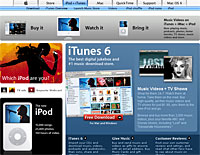 Apple’s iTunes online store has been ranked the seventh-largest music retailer in the US in the third quarter, charging into the top 10 for the first time.
Apple’s iTunes online store has been ranked the seventh-largest music retailer in the US in the third quarter, charging into the top 10 for the first time. Already eating iTunes’ dust are big names like Tower Records and Borders, reflecting music fans’ growing passion for online music.
Already eating iTunes’ dust are big names like Tower Records and Borders, reflecting music fans’ growing passion for online music. Combined revenue from the iPod, Apple’s fastest- selling product, and iTunes music accounted for a massive 40 percent of sales last quarter, up from 27 percent a year earlier.
Combined revenue from the iPod, Apple’s fastest- selling product, and iTunes music accounted for a massive 40 percent of sales last quarter, up from 27 percent a year earlier. The Internet was supposed to herald in an age of paperless offices, online browsing and tree-untroubling electronic mail, but it seems that when it comes to flogging goods, the trusty old print catalogue still rules the roost.
The Internet was supposed to herald in an age of paperless offices, online browsing and tree-untroubling electronic mail, but it seems that when it comes to flogging goods, the trusty old print catalogue still rules the roost. The survey found that old fashioned catalogues remain one of the most effective promotional channels for generating online orders, with 60% of survey respondents currently licking stamps on catalogues and brochures to be sent to customers in an attempt to increase online sales.
The survey found that old fashioned catalogues remain one of the most effective promotional channels for generating online orders, with 60% of survey respondents currently licking stamps on catalogues and brochures to be sent to customers in an attempt to increase online sales. Additionally, the survey revealed that 55% of retailers planned to follow the annoying trend set by High Street stores and “extend” the Christmas buying period by encouraging consumers to buy earlier (If only we could “extend” the Christmas holiday period too).
Additionally, the survey revealed that 55% of retailers planned to follow the annoying trend set by High Street stores and “extend” the Christmas buying period by encouraging consumers to buy earlier (If only we could “extend” the Christmas holiday period too). Around 80% of consumers are expected to buy at least a quarter of their Christmas purchases online this year – up a mighty 15% over last year.
Around 80% of consumers are expected to buy at least a quarter of their Christmas purchases online this year – up a mighty 15% over last year. Nielsen, the top American agency that measures TV viewing audiences, is going to provide ratings that take account of time-shifted viewing through digital recording devices like TiVos even though viewers are able to, and in my experience, generally do, fast-forward through the paid for messages.
Nielsen, the top American agency that measures TV viewing audiences, is going to provide ratings that take account of time-shifted viewing through digital recording devices like TiVos even though viewers are able to, and in my experience, generally do, fast-forward through the paid for messages.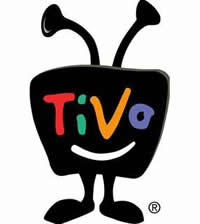 The US networks say that time-shifted ratings should be taken into account, and point out that PVR users watch more TV – which we don’t dispute. They watch around 5.7 hours and that’s more than 10% extra when compared with the technologically-disadvantaged standard household. Their logic follows that this extra 10% of viewing, gives them more opportunity to see commercials. With PVR penetration in the USA already around 8% of the TV universe and expected to rise steadily over the coming years, this adds up to a is significant amount for media buyers.
The US networks say that time-shifted ratings should be taken into account, and point out that PVR users watch more TV – which we don’t dispute. They watch around 5.7 hours and that’s more than 10% extra when compared with the technologically-disadvantaged standard household. Their logic follows that this extra 10% of viewing, gives them more opportunity to see commercials. With PVR penetration in the USA already around 8% of the TV universe and expected to rise steadily over the coming years, this adds up to a is significant amount for media buyers. Convergence took a step forward Friday past as Cisco announced the takeover of Scientific Atlanta (SA). The price? $6.9 billion cash.
Convergence took a step forward Friday past as Cisco announced the takeover of Scientific Atlanta (SA). The price? $6.9 billion cash. The acquisition looks a good fit though, Cisco are keen to push their IPTV proposition, SA’s strength in the US set-top-box market (they have around 40% market share) will allow them to capitalise on the access to the home that video brings. The companies’ combined news release majors on this, John Chambers, president and chief executive officer of Cisco Systems said “Video is emerging as the key strategic application in the service provider triple play bundle of consumer entertainment, communication and online services.”
The acquisition looks a good fit though, Cisco are keen to push their IPTV proposition, SA’s strength in the US set-top-box market (they have around 40% market share) will allow them to capitalise on the access to the home that video brings. The companies’ combined news release majors on this, John Chambers, president and chief executive officer of Cisco Systems said “Video is emerging as the key strategic application in the service provider triple play bundle of consumer entertainment, communication and online services.” Formed in 1951, SA has long been a market leader in Cable TV, has a healthy balance sheet and already has one large IPTV customer in the shape of SBC Communications. The critical mass of SA as part of Cisco should help it win more.
Formed in 1951, SA has long been a market leader in Cable TV, has a healthy balance sheet and already has one large IPTV customer in the shape of SBC Communications. The critical mass of SA as part of Cisco should help it win more. Because Criminals Make the Best Police Officers
Because Criminals Make the Best Police Officers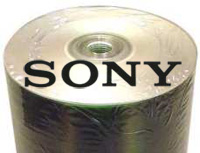 The other law other are saying have been broken by SonyBMG, and this is one that could land them in BIG legal difficulties, is
The other law other are saying have been broken by SonyBMG, and this is one that could land them in BIG legal difficulties, is  It also provides practical guidance on how to use search effectively but safely, for example, by monitoring or filtering your search results.
It also provides practical guidance on how to use search effectively but safely, for example, by monitoring or filtering your search results. Yesterday, Sky’s takeover of Easynet was finalised and it looks to many that, despite paying a premium on the share price, they’ve have quite a bargain on their hands.
Yesterday, Sky’s takeover of Easynet was finalised and it looks to many that, despite paying a premium on the share price, they’ve have quite a bargain on their hands. Although reports that broadband is the latest media battleground have highlighted the moves by the UK telcos, the ultimate prize is the fabled home digital information gateway. The opportunities that this acquisition enables go beyond a mere triple play option (Inernet, TV & Telephone), allowing Sky to, begin by become the overriding aggregator of TV content and, in time, become the preferred digital gatekeeper for many UK homes.
Although reports that broadband is the latest media battleground have highlighted the moves by the UK telcos, the ultimate prize is the fabled home digital information gateway. The opportunities that this acquisition enables go beyond a mere triple play option (Inernet, TV & Telephone), allowing Sky to, begin by become the overriding aggregator of TV content and, in time, become the preferred digital gatekeeper for many UK homes.